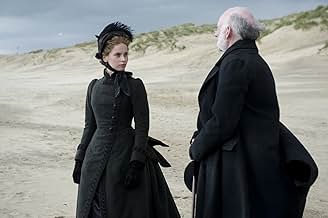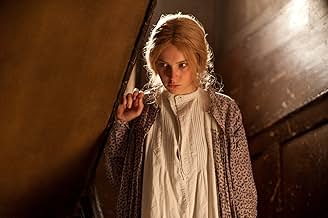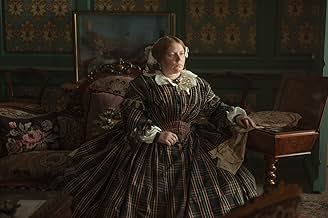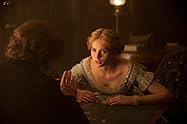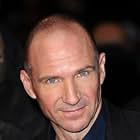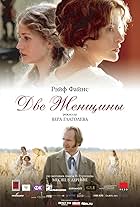At the height of his career, Charles Dickens meets a younger woman who becomes his secret lover until his death.At the height of his career, Charles Dickens meets a younger woman who becomes his secret lover until his death.At the height of his career, Charles Dickens meets a younger woman who becomes his secret lover until his death.
- Director
- Writers
- Stars
- Nominated for 1 Oscar
- 1 win & 7 nominations total
Ralph Fiennes
- Charles Dickens
- (as Mr. Ralph Fiennes)
Felicity Jones
- Nelly
- (as Ms. Felicity Jones)
Kristin Scott Thomas
- Mrs. Frances Ternan
- (as Ms. Kirstin Scott Thomas)
Tom Hollander
- Wilkie Collins
- (as Mr. Tom Hollander)
John Kavanagh
- Rev. William Benham
- (as Mr. John Kavanagh)
Tom Attwood
- Mr. Lambourne
- (as Mr. Tom Atwood)
Susanna Hislop
- Mary
- (as Ms. Susanna Hislop)
Tom Burke
- Mr. George Wharton Robinson
- (as Mr. Tom Burke)
Tommy Curson-Smith
- Geoffrey
- (as Mr. Tommy Curson-Smith)
David Collings
- Governor
- (as Mr. David Collings)
Michael Marcus
- Charley Dickens
- (as Mr. Michael Marcus)
Perdita Weeks
- Maria Ternan
- (as Ms. Perdita Weeks)
Richard McCabe
- Mr. Mark Lemon
- (as Mr. Richard McCabe)
Gabriel Vick
- Mr. Berger
- (as Mr. Gabriel Vick)
Mark Dexter
- Mr. Augustus Egg
- (as Mr. Mark Dexter)
Joseph Paxton
- Mr. Pigott
- (as Mr. Joseph Paxton)
Sophie Russell
- Miss Ellen Sabine
- (as Ms. Sophie Russell)
Christos Lawton
- Mr. Evans
- (as Mr. Christos Lawton)
- Director
- Writers
- All cast & crew
- Production, box office & more at IMDbPro
Featured reviews
Claire Tomalin in the first chapter of 'The Invisible Woman' states that Fanny and Ellen Ternan were 'written out of any biographies of both Dickens and Trollope for two reasons'. Thus begins the first of many such statements that appear in her book that can't be substantiated. They are not facts, though they are presented as such. Any film based on the book by Claire Tomalin can only suffer, as a result, from the contrived nature and bias of the book.
Yes, this film might have deserved 8 out of 10 stars if Charles Dickens hadn't come into it and it was simply the story of a writer who had an affair with a much younger woman in Victorian times. Unfortunately, Charles Dickens does come into it, and he has come into it in every review and discussion about this film that I've come across so far.
The first half of Ralph Fiennes' film is beautifully nuanced and utterly delightful in its depiction of Dickens and his relationship with the Ternan family through their mutual love of the theatre. The developing relationship between Dickens and Ellen Ternan is persuasive in cinematic terms - until the downward slide into the mire of 'revelations' spawned by Claire Tomalin's book.
Stripped of meaningful content, cinematography and acting too become meaningless. When a film is based on the life of a great writer like Charles Dickens, those who have read widely about his life and work will feel uneasy when he is taken out of context to fulfil a role aggressively forced on him by a less than scrupulous biographer or film maker. The so-called 'revelations' translated to film may spoil one's enjoyment of the narrative as surely as a poor reproduction of a film to a DVD will lessen its visual impact.
Those who have a scant knowledge of Dickens and his work will more easily be able to accept this depiction of the writer and the man. Sadly, like many of the reviewers and others connected with the film, they may then become 'authorities' on Charles Dickens and his relationship with Ellen Ternan and busily go about perpetuating myths and gross distortions of facts.
By the time furtive sex is followed by the birth of a still-born child and Dickens and Ellen appear unchaperoned in the Staplehurst train crash, the sound of Nelly's pacing on the beach at Margate becomes deafening - but also more laboured. We enter a world of fiction that is not nearly so satisfying. The more the film strays from known sources and tries to convince, the more it flounders and disappoints.
One can only hope someone makes another film about Charles Dickens that does justice to everyone in a way that saves them from the strange mix of sexual fantasy and strident feminism they appear to have generated. While Nelly suffers from not having the reasons for the secrecy surrounding her relationship fully explored, Catherine Dickens and George Wharton Robinson suffer in a way that endows them with as much character as a couple of wooden pieces in a jig-saw puzzle.
'It would be a far, far better thing' to stay home and read Dickens' letters or other biographies or more of Dickens' own writing or Edward Wagenknecht's 'Dickens and the Scandalmongers' or more about the social and sexual mores of the time than to believe this film could possibly shed any light on the less stereotypical but more complex relationship between Charles Dickens and Ellen Ternan.
Yes, this film might have deserved 8 out of 10 stars if Charles Dickens hadn't come into it and it was simply the story of a writer who had an affair with a much younger woman in Victorian times. Unfortunately, Charles Dickens does come into it, and he has come into it in every review and discussion about this film that I've come across so far.
The first half of Ralph Fiennes' film is beautifully nuanced and utterly delightful in its depiction of Dickens and his relationship with the Ternan family through their mutual love of the theatre. The developing relationship between Dickens and Ellen Ternan is persuasive in cinematic terms - until the downward slide into the mire of 'revelations' spawned by Claire Tomalin's book.
Stripped of meaningful content, cinematography and acting too become meaningless. When a film is based on the life of a great writer like Charles Dickens, those who have read widely about his life and work will feel uneasy when he is taken out of context to fulfil a role aggressively forced on him by a less than scrupulous biographer or film maker. The so-called 'revelations' translated to film may spoil one's enjoyment of the narrative as surely as a poor reproduction of a film to a DVD will lessen its visual impact.
Those who have a scant knowledge of Dickens and his work will more easily be able to accept this depiction of the writer and the man. Sadly, like many of the reviewers and others connected with the film, they may then become 'authorities' on Charles Dickens and his relationship with Ellen Ternan and busily go about perpetuating myths and gross distortions of facts.
By the time furtive sex is followed by the birth of a still-born child and Dickens and Ellen appear unchaperoned in the Staplehurst train crash, the sound of Nelly's pacing on the beach at Margate becomes deafening - but also more laboured. We enter a world of fiction that is not nearly so satisfying. The more the film strays from known sources and tries to convince, the more it flounders and disappoints.
One can only hope someone makes another film about Charles Dickens that does justice to everyone in a way that saves them from the strange mix of sexual fantasy and strident feminism they appear to have generated. While Nelly suffers from not having the reasons for the secrecy surrounding her relationship fully explored, Catherine Dickens and George Wharton Robinson suffer in a way that endows them with as much character as a couple of wooden pieces in a jig-saw puzzle.
'It would be a far, far better thing' to stay home and read Dickens' letters or other biographies or more of Dickens' own writing or Edward Wagenknecht's 'Dickens and the Scandalmongers' or more about the social and sexual mores of the time than to believe this film could possibly shed any light on the less stereotypical but more complex relationship between Charles Dickens and Ellen Ternan.
A 6 or a 7? I went with 6, but would have preferred 6.5.
The film is beautifully made, which is no surprise, with beautiful costumes and scenery from the Victorian era, as well as being beautifully acted and well produced. However, although loosely based on the biographical book of the same name (The Invisible Woman), the plot line is vague and esoteric; that is, "intended for or likely to be understood by only a small number of people with a specialized knowledge or interest."
We see glimpses into the life and behaviors of Dickens, his mistress Ellen "Nelly" Ternan, and Dickens' wife, but the film provides little depth or detail, and certainly no explanation for the meaning of these glimpses, or even a clear time line. If you know enough about Dickens ahead of time it will make sense; if not, it will remain a mystery (such as, "what was that scene about?") unless you, as I did this morning, start learning more about Dickens' life as he lived it, including better understanding the book the film was based upon. We see otherwise unexplained glimpses into the life of Dickens and Nelly, some of which seem to be inaccurate dramatizations (poetic license?), which have little meaning on their own, and leave you wondering what just happened, and why was that important. You'll get the overall picture, but it will be like a jigsaw puzzle with many missing pieces, some of which , because of those missing pieces, are actually incorrectly put together. If you're not already familiar with the life of Dickens and Ternan, read up on Dickens before you go, or be prepared to read up on him after you see the movie. But don't otherwise expect to come up with a clear picture of anything, except that Dickens and Ternan had a long-standing affair that affected her past his death.
The film is beautifully made, which is no surprise, with beautiful costumes and scenery from the Victorian era, as well as being beautifully acted and well produced. However, although loosely based on the biographical book of the same name (The Invisible Woman), the plot line is vague and esoteric; that is, "intended for or likely to be understood by only a small number of people with a specialized knowledge or interest."
We see glimpses into the life and behaviors of Dickens, his mistress Ellen "Nelly" Ternan, and Dickens' wife, but the film provides little depth or detail, and certainly no explanation for the meaning of these glimpses, or even a clear time line. If you know enough about Dickens ahead of time it will make sense; if not, it will remain a mystery (such as, "what was that scene about?") unless you, as I did this morning, start learning more about Dickens' life as he lived it, including better understanding the book the film was based upon. We see otherwise unexplained glimpses into the life of Dickens and Nelly, some of which seem to be inaccurate dramatizations (poetic license?), which have little meaning on their own, and leave you wondering what just happened, and why was that important. You'll get the overall picture, but it will be like a jigsaw puzzle with many missing pieces, some of which , because of those missing pieces, are actually incorrectly put together. If you're not already familiar with the life of Dickens and Ternan, read up on Dickens before you go, or be prepared to read up on him after you see the movie. But don't otherwise expect to come up with a clear picture of anything, except that Dickens and Ternan had a long-standing affair that affected her past his death.
The titular Invisible Woman is Nelly Ternan, the young woman who became Charles Dickens' (1812-1870) mistress. How this liaison came about was a complete surprise to me and therefore must remain unsaid since it would IMO constitute a spoiler (most folks plow right through spoiler alerts anyway so that won't work). Nelly is played by Felicity Jones and Kristin Scott Thomas plays Nelly's mother, both who are more than competent but who have unspectacular roles.
It's all Ralph Fiennes who plays Dickens as ebullient, enthusiastic, and even flamboyant and is given a great opportunity to shine, which he does.. He also directs and was not originally set to play the lead but they couldn't find anyone else. Fiennes dominates the film so and yet the best parts for me was the work of an actress named Joanna Scanian who plays poor Mrs Dickens. Short and rotund and with an appearance of possible simple-mindedness (first impression) she rallies and practically steals the show. She is intelligent, perspicacious in how she views her husband, and is quietly courageous in an awkward scene with Nelly.
After reading the separation letter from Charles, her breakdown is severe yet restrained exhibiting an extraordinary piece of slice-of-life acting. If Charles likeability, which is considerable, is to make us forgive him for his treatment of his wife, it will have to withstand the effect of her scenes, which makes us look at him more harshly. And yet she doesn't attack him directly, it's her person that effects us (and with very little screen time). After reading a little of the history, the film seems a faithful rendering.
It's all Ralph Fiennes who plays Dickens as ebullient, enthusiastic, and even flamboyant and is given a great opportunity to shine, which he does.. He also directs and was not originally set to play the lead but they couldn't find anyone else. Fiennes dominates the film so and yet the best parts for me was the work of an actress named Joanna Scanian who plays poor Mrs Dickens. Short and rotund and with an appearance of possible simple-mindedness (first impression) she rallies and practically steals the show. She is intelligent, perspicacious in how she views her husband, and is quietly courageous in an awkward scene with Nelly.
After reading the separation letter from Charles, her breakdown is severe yet restrained exhibiting an extraordinary piece of slice-of-life acting. If Charles likeability, which is considerable, is to make us forgive him for his treatment of his wife, it will have to withstand the effect of her scenes, which makes us look at him more harshly. And yet she doesn't attack him directly, it's her person that effects us (and with very little screen time). After reading a little of the history, the film seems a faithful rendering.
So much so that her husband forgets to name her when introducing his family. Charles Dickens was always fascinated by very young, slender, virginal girls, they are venerated in all his novel. His wife had been such a girl when he married her, but after giving him ten children in a period without anesthetic, she has naturally gained weight and aged. He may tell himself the classic, "my wife doesn't understand me," but it's clear he really just wants a new young, slender girl. The film itself doesn't seem to buy the story that his wife is intellectually boring but instead clearly shows Dickens flinching in disgust when he looks at his wife.
Neither are we shown any brilliance of mind in Nelly as the actress maintains a slack jawed, rabbit-like expression through most of her scenes.
Most biographies depict Dickens as not only treating his wife as invisible, but openly ridiculing her and inventing ways to be cruel to her. We see an example of that here when he makes her take his gift of jewelry to his mistress.
Why we should find this affair romantic I don't know. It's boring and trite and, worst of all, taints any future reading of his novels. A film about the life of Catherine Dickens sounds much more interesting.
Neither are we shown any brilliance of mind in Nelly as the actress maintains a slack jawed, rabbit-like expression through most of her scenes.
Most biographies depict Dickens as not only treating his wife as invisible, but openly ridiculing her and inventing ways to be cruel to her. We see an example of that here when he makes her take his gift of jewelry to his mistress.
Why we should find this affair romantic I don't know. It's boring and trite and, worst of all, taints any future reading of his novels. A film about the life of Catherine Dickens sounds much more interesting.
If a renowned writer were to embark in an affair with a younger woman, it would make some headlines, generate some chatter but most of us will leave it at that.
That was not the case in the 1850's. When esteemed author Charles Dickens begun an affair, all sorts of efforts were put in place to stop it from becoming public. Divorce in that time, was an absolute scandal, an abomination.
So, this young, attractive, talented woman who in all certainty had a profound effect in the works of one of the most respected writers in the English language was in effect an invisible woman. Whilst she was the centre of Dickens' world, the world ought to not know her. Such were those times.
Whilst it might appear as sluggish, even flat that is not so. We get to observe the effect of the affair amongst people who had a compulsion to appear composed and reserved at all times. It is a glimpse in to a world gone by.
That was not the case in the 1850's. When esteemed author Charles Dickens begun an affair, all sorts of efforts were put in place to stop it from becoming public. Divorce in that time, was an absolute scandal, an abomination.
So, this young, attractive, talented woman who in all certainty had a profound effect in the works of one of the most respected writers in the English language was in effect an invisible woman. Whilst she was the centre of Dickens' world, the world ought to not know her. Such were those times.
Whilst it might appear as sluggish, even flat that is not so. We get to observe the effect of the affair amongst people who had a compulsion to appear composed and reserved at all times. It is a glimpse in to a world gone by.
Storyline
Did you know
- TriviaRalph Fiennes and Felicity Jones appeared in Cemetery Junction (2010), in which they played father and daughter. In a 2013 interview with Jones and Fiennes on National Public Radio, Jones said that it was "weird" and "very Freudian" to go from playing one relationship to the other, but Fiennes disagreed, saying "It's just a job. Come on."
- GoofsWhen collecting cash for the hospital, there is an 1895 Crown coin on the plate. Charles Dickens died in 1870.
- Quotes
Charles Dickens: A wonderful fact to reflect upon, that every human creature is a profound secret and mystery to every other.
Nelly: Until that secret is given to another to look after. And then perhaps two human creatures may know each other.
- Crazy creditsThe full cast list (in order of appearance) is presented in the style of a Dickens era theatre programme, with contemporary font and the performers' names preceded by "Mr." or "Ms."
- ConnectionsFeatured in Film '72: Episode dated 30 January 2014 (2014)
- SoundtracksSir Roger de Coverly
(uncredited)
Traditional
[Dickens dances with Nelly]
- How long is The Invisible Woman?Powered by Alexa
Details
- Release date
- Countries of origin
- Official site
- Languages
- Also known as
- Görünmeyen Kadın
- Filming locations
- Production companies
- See more company credits at IMDbPro
Box office
- Gross US & Canada
- $1,234,254
- Opening weekend US & Canada
- $31,948
- Dec 29, 2013
- Gross worldwide
- $3,986,888
- Runtime1 hour 51 minutes
- Color
- Sound mix
- Aspect ratio
- 2.35 : 1
Contribute to this page
Suggest an edit or add missing content








